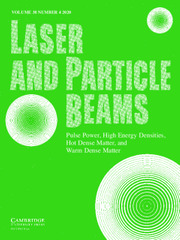Crossref Citations
This article has been cited by the following publications. This list is generated based on data provided by
Crossref.
Tahir, N.A.
and
Hoffmann, D.H.H.
1994.
Development of high gain reduced tritium targets for inertial fusion.
Fusion Engineering and Design,
Vol. 24,
Issue. 4,
p.
413.
Kawata, Shigeo
1995.
Inhomogeneous mixing of D and T fuels in inertial confinement fusion.
Laser and Particle Beams,
Vol. 13,
Issue. 3,
p.
383.
Tabak, M
1996.
What is the role of tritium-poor fuels in ICF?.
Nuclear Fusion,
Vol. 36,
Issue. 2,
p.
147.
Tahir, N. A.
and
Hoffmann, D. H. H.
1996.
A Study of Energy Output from Implosion of a Reactor-Size Indirect Drive Reduced Tritium Inertial Fusion Target.
Fusion Technology,
Vol. 29,
Issue. 1,
p.
171.
Tahir, N.A.
and
Hoffmann, D.H.H.
1997.
Development of advanced fuel inertial fusion targets.
Laser and Particle Beams,
Vol. 15,
Issue. 4,
p.
575.
Atzeni, S
and
Ciampi, M.L
1997.
Burn performance of fast ignited, tritium-poor ICF fuels.
Nuclear Fusion,
Vol. 37,
Issue. 12,
p.
1665.
Tahir, N. A.
Lutz, K.-J
Geb, O.
Maruhn, J. A.
Deutsch, C.
and
Hoffmann, D. H. H.
1997.
Inertial confinement fusion using hohlraum radiation generated by heavy-ion clusters.
Physics of Plasmas,
Vol. 4,
Issue. 3,
p.
796.
Tahir, Naeem A.
and
Hoffmann, Dieter H. H.
1998.
Burn Characteristics of Advanced Fuel Inertial Fusion Targets.
Fusion Technology,
Vol. 33,
Issue. 2,
p.
164.
Kawata, S
Kurawaki, K
Hirota, K
and
Fujita, K
1999.
D and T mixing imbalance and inhomogeneity in an inertial confinement fusion pellet.
Fusion Engineering and Design,
Vol. 44,
Issue. 1-4,
p.
191.
Aleksandrova, I.V.
Belolipetskiy, A.A.
Koresheva, E.R.
and
Tolokonnikov, S.M.
2008.
Survivability of fuel layers with a different structure under conditions of the environmental effects: Physical concept and modeling results.
Laser and Particle Beams,
Vol. 26,
Issue. 4,
p.
643.
Aleksandrova, I.
Belolipetskiy, A.
Koresheva, E.
Safronov, A.
Timasheva, T.
Timofeev, I.
and
Tolokonnikov, S.
2008.
Thermal and mechanical responses of cryogenic targets with different fuel-layer anisotropy during the delivery process.
Journal of Russian Laser Research,
Vol. 29,
Issue. 5,
p.
428.
Nayak, Bishnupriya
2013.
Reactivities of neutronic and aneutronic fusion fuels.
Annals of Nuclear Energy,
Vol. 60,
Issue. ,
p.
73.
Kawata, S.
Karino, T.
and
Ogoyski, A. I.
2016.
Review of heavy-ion inertial fusion physics.
Matter and Radiation at Extremes,
Vol. 1,
Issue. 2,
p.
89.
Aleksandrova, I. V.
Koresheva, E. R.
Krokhin, O. N.
and
Osipov, I. E.
2016.
Cryogenic hydrogen fuel for controlled inertial confinement fusion (formation of reactor-scale cryogenic targets).
Physics of Atomic Nuclei,
Vol. 79,
Issue. 7,
p.
1210.
Kawata, Shigeo
2021.
Direct-drive heavy ion beam inertial confinement fusion: a review, toward our future energy source.
Advances in Physics: X,
Vol. 6,
Issue. 1,


